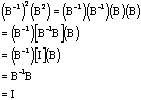Hi,
For your first question it is instructive to first consider the problem for
real numbers A and B. For example, if A=1 and B=-1, then A^2=B^2
yet A and B are not equal. This situation is even worse with complex numbers:
let A=1 and B= ![]() , where i^2 = -1.
In this case A^3=B^3, yet neither A equals B nor A^2 equals B^2.
, where i^2 = -1.
In this case A^3=B^3, yet neither A equals B nor A^2 equals B^2.
We can extend these ideas to matrices. Let
 and
and 
Then, again, A^3=B^3. Observe that not only is B different from A, but B is not even a scalar multiple of A; that is, A and B are linearly independent.
Now what about determinants? If A^n = B^n, then det(A^n)=det(B^n), which, by using the fact that the determinant of a product is a product of determinants, says that (det A)^n= (det B)^n. Thus with matrices of real numbers, det(A) is either det(B) or -det(B); with matrices of complex numbers, det(A) is z det(B), where z is a complex number of modulus 1.
To see what to do with the second question try it with n=2. Here

Now it should be clear what to do for any positive integer n.
Cheers,
Doug
To return to the previous page use your browser's back button.